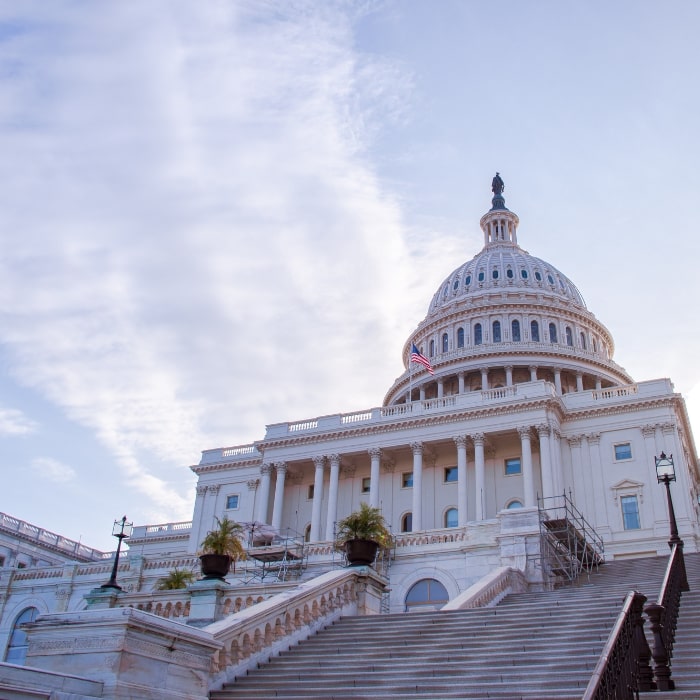Deepen your knowledge and expand your expertise through our CMIST minors
Undergraduate minors complement students’ primary areas of study and add depth and interdisciplinarity. Minors tend to be narrow in scope and therefore, CMIST offers six minors to meet the variety of interests of students across the university. Minors in CMIST cover topics including political science, international relations, cybersecurity, emerging technology’s impact on national security, American politics, legal issues and law, military strategy, and public policy.
Undergraduate students from any college and major in the university may declare a minor offered through CMIST. No application is required, however students must meet with the deputy director for academic affairs to discuss the requirements and declare the minor.
Minor in American Politics and Law
The minor in American Politics and Law is designed to equip students with comprehensive insights into the political and legal landscape of the United States. Our curriculum emphasizes an interdisciplinary approach, blending theoretical knowledge and practical skills. Students have the opportunity to engage with a variety of courses that cover key aspects of American civics, government, policy development, and legal principles. A core objective of this program is to nurture critical and analytical thinking skills through engagement with primary source materials, real world examples of policy and legal conflicts, and current events and matters of national policy debate. Students are challenged to dissect and debate major policy issues facing the nation, fostering their ability to develop, draft, and articulate informed political analyses and recommendations on complex matters.
Through this minor, students will develop a robust understanding of both the historical and contemporary dynamics of American politics and law. This approach ensures that they not only grasp the fundamentals but also learn to apply this knowledge in real-world scenarios. It provides a gateway to understanding the intricate workings of American governance and law, and a platform for building a career that makes a meaningful impact in society. The skills and objectives learned in the minor provide students from any discipline with core and foundational knowledge that is particularly useful for students entering law school, as well as other potential future careers in policymaking, politics, non-governmental organizations, political analysis, and legislative affairs, at all levels of government. In addition to those aspiring to careers in the public sector or law, this program is also uniquely tailored for students from diverse academic backgrounds seeking to integrate an understanding of American politics and domestic and international law into other disciplines.
Curriculum (60-63 units)
Foundational (18 units):
Students must complete:
- 84-104: Decision Processes in American Political Institutions (9)
- 84-120: Introduction to US Constitutional Law (9)
Communication (6-9 units):
Students must complete one of the following courses:
American Politics (18 units):
Students must complete 18 units from the following list of courses:
- 84-280: Popcorn and Politics: American Foreign Policy at the Movies (12)
- 84-304: Analysis of Current US National Security Priorities (6)
- 84-309: American Political Divides and Great Debates (9)
- 84-319: Civil-Military Relations (9)
- 84-324: The Future of Democracy (9)
- 84-325: Contemporary American Foreign Policy (9)
- 84-327: Who Really Runs America?: Subnational Governance and Policymaking (9)
- 84-328: Military Strategy and Doctrine (9)
- 84-338: Analysis of US Presidential Powers* (6)
- 84-347: Congress & National Security (9)
- 84-352: Representation and Voting Rights (9)
- 84-353: US-China Strategic Stability (6)
- 84-355: Democracy's Data: Analytics and Insights into American Elections (9)
- 84-358: Money, Connections, and Power: Interests and Influence in the US
- 84-365: The Politics of Fake News and Misinformation (9)
- 84-366: The 21st-Century Presidency: Expanding Powers, New Challenges (9)
- 84-367: The Politics of Antisemitism (9)
- 84-380: US Grand Strategy (9)
- 84-393: The US Congress: Legislative Progress or Paralysis? (9)
- 84-402: Judicial Politics and Behavior (9)
- 79-250: Voting Rights: An Introduction (9)
- 79-248: US Constitution & the Presidency (9)
Law (18 units):
Students must complete 18 units from the following list of courses:
- 84-285: Introduction to Legal Education and the Legal Profession (9)
- 84-331: Technology, Law, and Democracy (6)
- 84-332: Contemporary US Constitutional Law Issues* (6)
- 84-333: Law of US Democracy (9)
- 84-338: Analysis of US Presidential Powers* (6)
- 84-343: Offensive Cyber: Law & Policy (6)
- 84-349: Digital Diplomacy: Cybersecurity Challenges and Global Governance (9)
- 84-373: International Law (9)
- 84-402: Judicial Politics and Behavior (9)
- 14-684: Cyber Law and Ethics (6)
- 17-333: Privacy Policy, Law, and Technology (9)
- 66-221: Topics of Law: Introduction to Intellectual Property Law (9)
- 66-226 Law and Literature (9)
- 70-244: Contract Law and Strategy for Entrepreneurs (6)
- 70-364: Business Law (9)
- 73-408: Law and Economics (9)
- 76-219: Law & Blame (9)
- 76-475: Law, Performance, and Identity (9)
- 79-178: Equal Protection & the U.S. Constitution (9)
- 79-360: Crime, Policing, and the Law: Historical and Contemporary Perspectives (9)
- 88-281: Topics in Law: 1st Amendment (9)
- 88-284: Topics of Law: The Bill of Rights (9)
Students may double count a maximum of two courses with another major or minor. Unlimited double counting is permitted with general education requirements.
*Denotes courses taught in Washington, DC, through the Carnegie Mellon University Washington Semester Program (CMU/WSP).
Minor in Cybersecurity and International Conflict
The minor in cybersecurity and international conflict focuses on the existing gaps in our understanding of cybersecurity and international conflict. The minor exposes students to basic technology concepts, methods of attack and defense, potential strategy and goals for cyber-engagement, and response and forensics for cyber-engagements.
Alongside conventional methods of warfare, cybersecurity has rapidly developed into a centerpiece of a state’s ability to protect and project power. In the shifting landscape of cyber capabilities, how will laws, authorities, and policies keep pace? What are the implications and consequences of actions that may be considered “short of war” by some countries but “above the threshold” of conflict by others? Will a more aggressive defensive posture with respect to cybersecurity inadvertently increase the risk of conflict with states that sponsor malicious hacking groups? What is the proper balance between offense and defense in cybersecurity and how are cyber operations best integrated into a country’s overall military strategy?
Unlike some other kinds of tactics, attribution of cyber attacks presents significant challenges. If the aggressor’s identity cannot be quickly confirmed, how can a counterattack be launched? Some attackers may seek to mount “false flag” attacks and deception, for example, that misdirect defenders to counter-attack in the wrong direction. What are the appropriate rules of engagement for attacks on national systems, infrastructural systems, businesses, and individuals? When, for example, is a counterattack or a “kinetic” response permissible?
These questions have major implications for the study of war and peace. Those who seek to start a war may be harder to find and their motives more difficult to discern. The cybersecurity and international conflict minor tackles the social-scientific dimensions of cybersecurity with a focus on the implications of the cyber age for modern statecraft, warfare, elections (local, state, and national), and domestic and international politics.
Curriculum (60-63 units)
Foundational (9 units):
Students must take one of the following four foundational courses (9 units):
- 84-101: Introduction to Political Science (9)
- 84-104: Decision Processes in American Political Institutions (9)
- 84-226: International Relations (9)
- 84-275: Comparative Politics (9)
core courses (24-27 units):
Entry year 2025 and beyond (27 units):
Students must take all of the following core courses:
- 84-387: Remote Systems and the Cyber Domain in Conflict (9)
- 84-363: Click. Hack. Rule: Understanding the Power & Peril of Cyber Conflict (9)
- 84-405: The Future of Warfare (9)
Entry year 2024 and prior (24 units):
Students must take all of the following core courses:
- 84-387: Remote Systems and the Cyber Domain in Conflict (9)
- 84-363: Click. Hack. Rule: Understanding the Power & Peril of Cyber Conflict (9) or 84-383: National Cyber Policy & Strategy (6) or 84-388: Concepts of War and Cyber War (6)
- 84-405: The Future of Warfare (9)
Elective Courses (27 units):
Students must take three courses from the following list of elective courses (27 units). At least one course (9 units) must be taken from the Carnegie Mellon Institute for Strategy & Technology (CMIST) and have an 84-number:
- 84-110: The Economics of Politics and Technology (9)
- 84-200: Security War Game Simulation (6)
- 84-274: An Introduction to Technology and War (9)
- 84-280: Popcorn and Politics: American Foreign Policy at the Movies (12)
- 84-304: Analysis of Current US National Security Priorities (6)
- 84-312: Terrorism in Sub-Saharan Africa (6)
- 84-314: Politics, Technological Change, and Economic Growth (9)
- 84-319: Civil-Military Relations (9)
- 84-323: War and Peace in the Contemporary Middle East (9)
- 84-325: Contemporary American Foreign Policy (9)
- 84-328: Military Strategy and Doctrine (9)
- 84-329: Asian Strategies (6)
- 84-331: Technology, Law, and Democracy (6)
- 84-341: Transnational Criminal Networks & International Security (6)
- 84-343: Offensive Cyber: Law & Policy (6)
- 84-347: Congress & National Security (9)
- 84-349: Digital Diplomacy: Cybersecurity Challenges and Global Governance (9)
- 84-350: A Strategist's Introduction to Artificial Intelligence (9)
- 84-353: US-China Strategic Stability (6)
- 84-356: Applied Political Data Analytics (9)
- 84-363: Click. Hack. Rule: Understanding the Power & Peril of Cyber Conflict (9)*
- 84-365: The Politics of Fake News and Misinformation (9)
- 84-368: Technology Ethics (9)
- 84-370: Nuclear Security & Arms Control (9)
- 84-371 International Governance of Artificial Intelligence (9)
- 84-372: Space and National Security (9)
- 84-373: International Law (9)
- 84-375: Geopolitics of Innovation (9)
- 84-380: US Grand Strategy (9)
- 84-383: National Cyber Policy & Strategy (6)*
- 84-386: The Privatization of Force (9)
- 84-388: Concepts of War and Cyber War (6)*
- 84-389: Terrorism and Insurgency (9)
- 84-390: Social Media, Technology, and Conflict (9)
- 14-684: Cyber Law and Ethics (6)
- 16-735: Ethics and Robotics (12)
- 17-200: Ethics and Policy Issues in Computing (9)
- 17-303: Cryptocurrencies, Blockchains and Applications (Var.)
- 17-331: Information Security, Privacy, and Policy (12)
- 17-333: Privacy Policy, Law, and Technology (9)
- 17-334: Usable Privacy and Security (9)
- 17-702: Current Topics in Privacy Seminar (3)
- 79-301: History of Surveillance: From the Plantation to Data Capitalism (6)
- 79-302: Killer Robots:The Ethics, Law, and Politics of Lethal Autonomous Weapons Systems (6)
- 80-249: AI, Society, and Humanity (9)
- 95-444: Cybersecurity Policy and Governance II (12)
*This course counts as a core course for entry year 2024 and prior.
Students may double count a maximum of two courses with another major or minor. Unlimited double counting is permitted with general education requirements.
Minor in International Relations and Political Science
The International Relations and Political Science (IRPS) minor is for students who want to learn how to think systematically and develop foundational knowledge about international and domestic politics. It examines international relations, comparative politics, and domestic politics from the discipline of political science. The minor emphasizes the importance of political institutions, decision-making by leaders in shaping policy, and contemporary challenges to the international system.
Students wrestle with a range of issues, including the future of democracy, the relationship between technology and politics, the drivers of war and peace, domestic politics across countries, and the formulation of effective foreign policies. Core courses for the IRPS minor establish a strong foundation in the study of political science and enable students to better understand the workings of political institutions, political behavior across countries, the decision-making of political leaders, the making of national and international policy, and prevailing challenges to the international system, among other topics. Electives allow students to investigate issues in security and technology, grand strategy and national security, cybersecurity and international conflict, military strategy and doctrine, the politics of key regions of the world, international political economy and economic policy, representation and voting rights, climate change and development, repression and human rights, international law and diplomacy, political psychology and public opinion, and social change and revolution.
Curriculum (63 units)
CORE COURSES (36 UNITS):
Entry year 2025 and beyond:
Students must take the following courses:
- 84-101: Introduction to Political Science (9)
- 84-110: The Economics of Politics and Technology or 73-102 Principles of Microeconomics, 73-103 Principles of Macroeconomics, or 73-104 Principles of Microeconomics Accelerated (9)
In addition, students must take two of the following three courses:
- 84-104: Decision Processes in American Political Institutions (9)
- 84-226: International Relations (9)
- 84-275: Comparative Politics (9)
If all three of the above courses are taken, the third may count as an elective.
Entry year 2024 and prior:
Students must take the following four core courses:
- 84-104: Decision Processes in American Political Institutions (9)
- 84-226: International Relations (9)
- 84-275: Comparative Politics (9)
- 84-110: The Economics of Politics and Technology or 73-102 Principles of Microeconomics, 73-103 Principles of Macroeconomics, or 73-104 Principles of Microeconomics Accelerated (9)
Electives (27 units):
Students select three courses (27 units) from any of the elective sequences below. Two courses (18 units) must be taken from the Carnegie Mellon Institute for Strategy & Technology and have an 84-number.
CMIST Electives
- 84-120: Introduction to US Constitutional Law
- 84-200: Security War Game Simulation
- 84-252: Briefing in the Policy World
- 84-274: An Introduction to Technology and War
- 84-280: Popcorn and Politics: American Foreign Policy at the Movies
- 84-285: Introduction to Legal Education and the Legal Profession
- 84-303: International Human Rights
- 84-304: Analysis of Current US National Security Priorities
- 84-306: Latin American Politics
- 84-309: American Political Divides and Great Debates
- 84-310: Policy in a Global Economy 1: International Trade and Trade Policy
- 84-311: Policy in a Global Economy 2: International Macroeconomics and Finance
- 84-312: Terrorism in Sub-Saharan Africa
- 84-314: Politics, Technological Change, and Economic Growth (9)
- 84-318: Politics of Developing Nations
- 84-319: Civil-Military Relations
- 84-322: Nonviolent Conflict and Revolution
- 84-323: War and Peace in the Contemporary Middle East
- 84-324: The Future of Democracy
- 84-325: Contemporary American Foreign Policy
- 84-327: Who Really Runs America?: Subnational Governance and Policymaking
- 84-328: Military Strategy and Doctrine
- 84-329: Asian Strategies
- 84-331: Technology, Law, and Democracy
- 84-333: Law of US Democracy
- 84-341: Transnational Criminal Networks & International Security
- 84-343: Offensive Cyber: Law & Policy
- 84-347: Congress & National Security
- 84-349: Digital Diplomacy: Cybersecurity Challenges and Global Governance
- 84-350: A Strategist's Introduction to Artificial Intelligence
- 84-352: Representation and Voting Rights
- 84-353: US-China Strategic Stability
- 84-355: Democracy's Data: Analytics and Insights into American Elections
- 84-356: Applied Political Data Analytics
- 84-358: Money, Connections, and Power: Interests and Influence in the US
- 84-362: Diplomacy and Statecraft
- 84-363: Click. Hack. Rule: Understanding the Power & Peril of Cyber Conflict
- 84-365: The Politics of Fake News and Misinformation
- 84-366: The 21st-Century Presidency: Expanding Powers, New Challenges
- 84-367: The Politics of Antisemitism
- 84-368: Technology Ethics
- 84-369: Decision Science for International Relations
- 84-370: Nuclear Security & Arms Control
- 84-371 International Governance of Artificial Intelligence
- 84-372: Space and National Security
- 84-373: International Law
- 84-375: Geopolitics of Innovation
- 84-380: US Grand Strategy
- 84-383: National Cyber Policy & Strategy
- 84-386: The Privatization of Force
- 84-387: Remote Systems and the Cyber Domain in Conflict
- 84-389: Terrorism and Insurgency
- 84-390: Social Media, Technology, and Conflict
- 84-393: The US Congress: Legislative Progress or Paralysis?
- 84-402: Judicial Politics and Behavior
- 84-405: The Future of Warfare
Courses taken in the political science core above and beyond the required number of units for the core may count as an elective for the minor.
Additional Electives
- 19-452: EPP Projects II
- 70-342: Managing Across Cultures
- 70-365: International Trade and International Law
- 70-430: International Management
- 73-332: Political Economy
- 76-318: Communicating in the Global Marketplace
- 79-203: The Other Europe: The Habsburgs, Communism, & Central/Eastern Europe, 1740-1990
- 79-205: 20th Century Europe
- 79-223: Mexico: From the Aztec Empire to the Drug War
- 79-227: Modern Africa: The Slave Trade to the End of Apartheid
- 79-229: The Origins of the Palestinian-Israeli Conflict, 1880-1948
- 79-230: Arab-Israeli Conflict Since 1948
- 79-257: Germany and the Second World War
- 79-262: Modern China: From the Birth of Mao ... to Now
- 79-264: Tibet and China: History and Propaganda
- 79-265: Russian History: Game of Thrones
- 79-266: Russian History and Revolutionary Socialism
- 79-267: The Soviet Union in World War II: Military, Political, and Social History
- 79-275: Introduction to Global Studies
- 79-288: Bananas, Baseball, and Borders: Latin America and the United States
- 79-301: History of Surveillance: From the Plantation to Data Capitalism
- 79-302: Killer Robots? The Ethics, Law, and Politics of Drones and A.I. in War
- 79-313: "Unwanted": Refugees, Asylum Seekers, and Patterns of Global Migration
- 79-314: How Do We Remember? The Politics and Culture of Memory
- 79-318: Sustainable Social Change: History and Practice
- 79-320: Women, Politics, and Protest
- 79-343: Education, Democracy, and Civil Rights
- 79-377: Food, Culture, and Power: A History of Eating
- 79-385: Out of Africa: The Making of the African Diaspora
- 80-135: Introduction to Political Philosophy
- 80-136: Social Structure, Public Policy & Ethics
- 80-249: AI, Society, and Humanity
- 80-321: Causation, Law, and Social Policy
- 80-335: Social and Political Philosophy
- 80-348: Health, Human Rights, and International Development
- 80-447: Global Justice
- 82-3xx or 4xx: Advanced Level Modern Languages Class
- 88-234: Negotiation: International Focus
- 88-281: Topics in Law: 1st Amendment
- 88-284: Topics of Law: The Bill of Rights
- 88-411: Rise of the Asian Economies
Students may double count a maximum of two courses with another major or minor. Unlimited double counting is permitted with general education requirements.
Minor in Military Strategy and International Relations
The minor in Military Strategy and International Relations focuses on military strategy and doctrine, the current national security landscape, including how cybersecurity and artificial intelligence influence national security decision-making, and the full range of strategic challenges facing future American leaders.
While the minor is open to all CMU undergraduates, it is particularly appropriate for CMU students embarking on the Reserve Officer Training Corps (ROTC) program as well as those interested in pursuing defense-related careers. CMU typically has several dozen ROTC students annually, spread throughout the university, along with many others who are interested in defense and strategy issues. Many students major in STEM fields, where they learn valuable technical skills but are exposed to little of the wider strategic context facing military leaders and decision-makers, or to the political and institutional frameworks in which they operate. This minor is designed to complement other disciplines and fill that gap.
In short, the Military Strategy and International Relations minor offers future military and defense leaders insight into the national and international strategic challenges they will navigate in the future.
The Military Strategy and International Relations minor teaches future leaders how diplomacy, information, economics, development, and defense intersect. It engages students in the whys and hows of national strategy, military planning, and the future of warfare. In addition, it emphasizes the political and institutional systems and rules in which military affairs are situated, with core courses on the topics of military strategy, governance, diplomacy, and policy decision-making. Finally, the minor stresses the use of cutting-edge analytical and social science methods to prepare students for advanced training, study, and government or military service in national and international security.
Curriculum (60-63 units)
CORE COURSES (27-33 UNITS):
Students must take the following core courses (27 units):
Military Strategy
- 84-328: Military Strategy and Doctrine (9)
Governance
- 84-319: Civil-Military Relations (9)
Diplomacy (select one)
- 84-280: Popcorn and Politics: American Foreign Policy at the Movies (12)
- 84-325: Contemporary American Foreign Policy (9)
- 84-362: Diplomacy and Statecraft (9)
Entry year 2024 and prior (33 units):
In addition to the courses noted above, students must also complete the following course:- 84-450: Policy Seminar (6)
Electives (27-36 units):
Students must complete a total of 36 units* (typically four courses) from the following list of courses. At least 18 units must be taken from the Carnegie Mellon Institute for Strategy & Technology (CMIST) and have an 84-number.
*For entry year 2024 and prior, students must complete a total of 27 units (typically three courses) and 9 units must come from CMIST.
Electives
- 84-104: Decision Processes in American Political Institutions (9)
- 84-120: Introduction to US Constitutional Law (9)
- 84-200: Security War Game Simulation (6)
- 84-226: International Relations (9)
- 84-274: An Introduction to Technology and War (9)
- 84-275: Comparative Politics (9)
- 84-280: Popcorn and Politics: American Foreign Policy at the Movies If not used as a core course, course may count as an elective. (12)
- 84-303: International Human Rights (6)
- 84-304: Analysis of Current US National Security Priorities (6)
- 84-309: American Political Divides and Great Debates (9)
- 84-312: Terrorism in Sub-Saharan Africa (6)
- 84-314: Politics, Technological Change, and Economic Growth (9)
- 84-318: Politics of Developing Nations (9)
- 84-322: Nonviolent Conflict and Revolution (9)
- 84-323: War and Peace in the Contemporary Middle East (9)
- 84-324: The Future of Democracy (9)
- 84-325: Contemporary American Foreign Policy If not used as a core course, course may count as an elective. (9)
- 84-329: Asian Strategies (6)
- 84-331: Technology, Law, and Democracy (6)
- 84-333: Law of US Democracy (9)
- 84-341: Transnational Criminal Networks & International Security (6)
- 84-343: Offensive Cyber: Law & Policy (6)
- 84-347: Congress & National Security (9)
- 84-349: Digital Diplomacy: Cybersecurity Challenges and Global Governance (9)
- 84-350: A Strategist's Introduction to Artificial Intelligence (9)
- 84-353: US-China Strategic Stability (6)
- 84-362: Diplomacy and Statecraft If not used as a core course, course may count as an elective. (9)
- 84-363: Click. Hack. Rule: Understanding the Power & Peril of Cyber Conflict (9)
- 84-365: The Politics of Fake News and Misinformation (9)
- 84-366: The 21st-Century Presidency: Expanding Powers, New Challenges (9)
- 84-367: The Politics of Antisemitism (9)
- 84-368: Technology Ethics (9)
- 84-370: Nuclear Security & Arms Control (9)
- 84-371: International Governance of Artificial Intelligence (9)
- 84-372: Space and National Security (9)
- 84-373: Emerging Technologies and International Law (9)
- 84-380: US Grand Strategy (9)
- 84-383: National Cyber Policy & Strategy (6)
- 84-386: The Privatization of Force (9)
- 84-387: Remote Systems and the Cyber Domain in Conflict (9)
- 84-389: Terrorism and Insurgency (9)
- 84-390: Social Media, Technology, and Conflict (9)
- 84-393: The US Congress: Legislative Progress or Paralysis? (9)
- 84-405: The Future of Warfare (9)
- 17-200: Ethics and Policy Issues in Computing (9)
- 32-201: Leadership & Management (9)
- 32-310: Evolution Of Warfare (9)
- 32-402: Leadership and Ethics (9)
- 79-257: Germany and the Second World War (9)
- 79-268: World War I: The Twentieth Century's First Catastrophe (9)
- 79-302: Killer Robots? The Ethics, Law, and Politics of Drones and A.I. in War (6)
- 80-136: Social Structure, Public Policy & Ethics (9)
Students may double count a maximum of two courses with another major or minor. Unlimited double counting is permitted with general education requirements.
Minor in Political Science, Security, and Technology
The Minor in Political Science, Security, and Technology is designed for students who are majoring in fields from the arts and humanities to science, engineering, and computer science. By adding a new dimension to their major field of study, these students will gain the background and knowledge to address the ethical, social, and political dimensions of new technologies from a political science perspective.
The minor in Political Science, Security, and Technology takes a social science (not technical) approach to studying emerging technologies that affect war and peace. There is no better place to study security and technology than Carnegie Mellon University, a thought leader in global and national security issues, policies, and strategies related to digital technologies. CMU students are uniquely poised to influence the future, with cutting-edge research happening across campus in all the relevant technological areas—e.g., machine learning, cybersecurity, robotics, big data, neuroscience, human-computer interaction, human enhancement, synthetic biology, and various types of artificial intelligence.
In completing this course of study, Carnegie Mellon undergraduates will learn how to analyze the political, economic, social, and ethical dimensions of new technologies, equipping themselves to contribute to vital political debates and influence technological developments in the public interest.
Students may double count a maximum of two courses with another major or minor. Unlimited double counting is permitted with General Education requirements.
Curriculum (63 units)
Political Science Core (18 units):
Entry year 2025 and beyond:
Students must complete:
- 84-101: Introduction to Political Science (9)
Students must complete one of the following courses:
- 84-104: Decision Processes in American Political Institutions (9)
- 84-226: International Relations (9)
- 84-275: Comparative Politics (9)
Entry year 2024 and prior:
Students must complete:
- 84-226: International Relations (9)
Students must complete one of the following courses:
Security and Technology Core (45 units):
Students must complete:
- 84-274: An Introduction to Technology and War (9)
Students must complete 36 units from the following list of courses:
- 84-314: Politics, Technological Change, and Economic Growth (9)
- 84-343: Offensive Cyber: Law & Policy (6)
- 84-347: Congress & National Security (9)
- 84-349: Digital Diplomacy: Cybersecurity Challenges and Global Governance (9)
- 84-350: A Strategist's Introduction to Artificial Intelligence (9)
- 84-353: US-China Strategic Stability (6)
- 84-356: Applied Political Data Analytics (9)
- 84-363: Click. Hack. Rule: Understanding the Power & Peril of Cyber Conflict (9)
- 84-368: Technology Ethics (9)
- 84-370: Nuclear Security & Arms Control (9)
- 84-371: International Governance of Artificial Intelligence (9)
- 84-372: Space and National Security (9)
- 84-375: Geopolitics of Innovation (9)
- 84-383: Cyber Policy as National Policy (6)
- 84-387: Remote Systems and the Cyber Domain in Conflict (9)
- 84-388: Concepts of War and Cyber War (6)
- 84-390: Social Media, Technology, and Conflict (9)
- 84-405: The Future of Warfare (9)
Students may double count a maximum of two courses with another major or minor. Unlimited double counting is permitted with general education requirements.
Minor in Politics and Public Policy
Rooted in the discipline of political science, the minor in Politics and Public Policy investigates US public policy issues and matters of American politics and law while providing students hands-on and practical learning experiences. Students pursuing the Politics and Public Policy minor must participate in the Carnegie Mellon University Washington Semester Program (CMU/WSP) for one semester during their undergraduate experience.
From embassies to non-governmental organizations, think tanks to advocacy organizations, government agencies to congressional offices, and consulting firms to media outlets, Washington, DC, is the center for many political, international relations, and public policy activities. Students in the program come into direct contact with political, business, and community leaders and learn about the most pressing policy issues of the day.
The CMU/WSP, sponsored by the university's Carnegie Mellon Institute for Strategy & Technology (CMIST), is a semester-long program in which students live, intern, and take CMU classes on Capitol Hill in Washington. Undergraduates from any course of study at the university may participate in the program. Students earn 48 units for the Carnegie Mellon University Washington Semester Program, interning about twenty-four hours per week in any sector or field of interest within the District of Columbia, metropolitan region, while taking classes on American politics, public policy, and law taught by Carnegie Mellon faculty.
Through this experiential learning program, CMU/WSP participants develop professional and networking skills, explore how coursework connects to the real world, learn to give and receive constructive feedback in the workplace and classroom, and intentionally reflect on their learning and growth. CMIST also sponsors events and policy-oriented opportunities in Washington for students participating in the program to further enrich their experience and enhance their understanding of how Washington functions as a hub of international and US policy decision-making.
Curriculum (66 units)
FOUNDATIONAL COURSE (9 UNITS):
Students select one course (9 units) from the following list of courses offered at Carnegie Mellon University’s Pittsburgh or Qatar campus. Students may take this course before or after participating in the CMU/WSP. Qatar students should contact the Deputy Director for Academic Affairs to identify appropriate substituitions taught in Qatar at neighboring universities.
- 84-101 Introduction to Political Science (9)
- 84-104 Decision Processes in American Political Institutions (9)
- 84-226: International Relations (9)
- 84-275: Comparative Politics (9)
DATA SCIENCE / ECONOMICS REQUIREMENT (9 UNITS):
Students must complete one course (9 units) from the following list of courses offered at Carnegie Mellon University’s Pittsburgh or Qatar campus. Students may take this course before or after participating in the CMU/WSP.
- 84-110: The Economics of Politics and Technology (9)
- 36-202: Methods for Statistics and Data Science (9)
- 73-102: Principles of Microeconomics (9)
- 73-103: Principles of Macroeconomics (9)
- 73-104: Principles of Microeconomics Accelerated (9)
INTERNSHIP (24 UNITS):
- 84-360: CMU/WSP: Internship Seminar (24)
SEMINAR ON PUBLIC POLICY RESEARCH, WRITING, AND IMPLEMENTATION (12 UNITS):
- 84-336: Implementing Public Policy: From Good Idea to Reality (spring) (12)
- 84-339: Seminar in Public Policy Research (fall) (12)
SEMINARS ON AMERICAN POLITICS, GOVERNANCE, INSTITUTIONS, AND LAW (12 UNITS):
Students enroll in one course in each mini during the semester they are in Washington, DC, for a total of 2 seminars and 12 units.
- 84-332: Contemporary US Constitutional Law Issues (6)
- 84-338: Analysis of US Presidential Powers (6)
Students may double count a maximum of two courses with another major or minor. Unlimited double counting is permitted with general education requirements.






